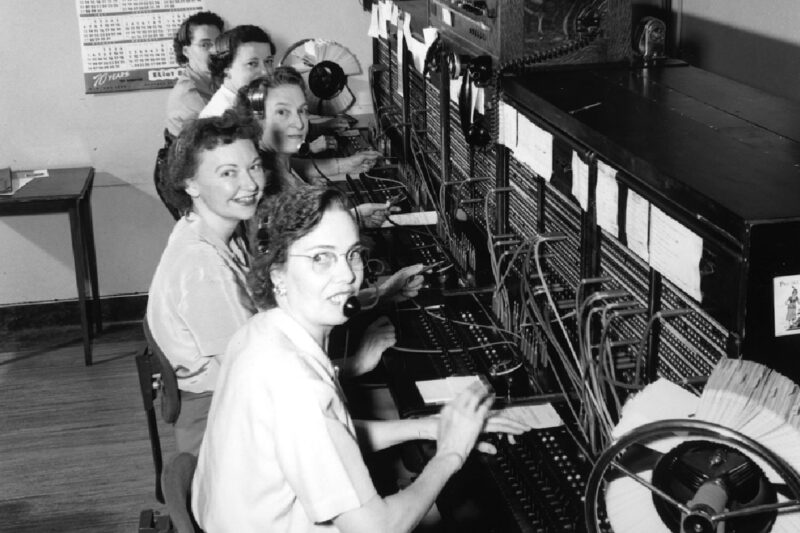This Women’s History Month, Celebrate Title VII for Banning Sex Discrimination in the Workplace


Fifty-two years ago, the world changed for American working women. That was the year Congress enacted the Civil Rights Act of 1964. While it was a landmark achievement for African-Americans’ struggle for equality, the statute also opened up significant opportunities for women and others. Title VII of the law barred employment discrimination on the basis of race, national origin, color, religion, and – in an 11th-hour addition – sex.
At the time, women’s job options were limited to a few low-paid fields, like secretarial, nursing, and teaching. Sexual harassment by bosses and co-workers alike was just a fact of life, and getting pregnant was tantamount to giving notice. (That is, if you were white; women of color have always worked in higher numbers than white women, including those with children at home.)
Yesterday, on International Women’s Day, my book “Because of Sex: One Law, Ten Cases, and Fifty Years That Changed American Women’s Lives at Work” was released nationwide. The book celebrates the seismic changes in the workplace made possible by Title VII. Because the statute didn’t define what discrimination “because of sex” meant, and because the sex provision was added to the law without extensive hearings, it was left largely to the brave working women — the feminist movement’s unsung heroes — to challenge various forms of sex discrimination in court. The precedents that came out of their cases are what gave shape to what we now understand to be women’s rights on the job.

In keeping with the 2016 International Women’s Day’s “pledge for parity” theme and Women’s History Month, here are just a few giant leaps towards gender parity that Title VII has made possible. The ACLU marks these occasions by celebrating working women’s progress and by pledging to help complete the journey toward parity on the job.
It’s illegal to reserve certain jobs “for men only” or “for women only.”
Title VII outlawed sex segregation of the job market, making it illegal for employers to post ads for “help wanted — male” and “help wanted — female.” In 1977, a woman named Kim Rawlinson sued to be an Alabama prison guard using Title VII. Alabama argued that she was too petite to handle the job. Her case went to the U.S. Supreme Court and resulted in a ruling that outlawed the use of height and weight thresholds that kept women out of jobs traditionally held by men.
Title VII also invalidated state “protective” laws that limited the kinds of jobs women were allowed to hold. Lorena Weeks of Georgia used Title VII to get promoted from telephone operator to switchman at Southern Bell, while Leah Rosenfeld of California used it to ascend to a job as a station agent with the Southern Pacific Railroad. Both women had been denied those jobs because they required lifting 25 pounds or more, but the courts hearing their cases held that that was no reason for reserving those positions for men. (Indeed, toddlers can weigh much more than 25 pounds and no one was suggesting women shouldn’t pick them up.)
Today women still remain clustered in low-wage fields like retail, administrative, and health care, while their numbers are in the single digits in higher-paying construction and managerial jobs. These divisions directly fuel stereotypes about the kind of work women can and want to do, and they further entrench the persistent wage gap. Sex, race, and national origin discrimination all play a role when women are steered into — or away from — certain jobs. The ACLU is committed to uprooting such practices through targeted litigation and advocacy. We also support government initiatives to end sex segregation and wage inequality, such as monitoring federal contractors’ hiring practices, promoting pay transparency, and facilitating women’s access into historically male-dominated fields.
Pregnant and parenting women can’t be treated as second class workers.
It used to be that employers could single pregnancy out for all sorts of penalties, from simply firing pregnant workers to erasing their seniority during maternity leave, refusing to provide health insurance for pregnancy and childbirth, and excluding pregnancy from paid leave and other benefits programs. Working mothers faced openly biased treatment, too. Title VII, as amended in 1978 by the Pregnancy Discrimination Act, made those practices illegal.
Through direct legal representation, the ACLU has won policy changes in workplaces across the country and recovered lost wages for pregnant and parenting workers forced off the job. In the 1980s, the ACLU took a lead role in challenging employers’ “fetal protection policies” that excluded all fertile women from jobs deemed too risky for them, no matter whether they planned on having children. That strategy helped secure the unanimous 1991 Supreme Court ruling in UAW v. Johnson Controls, Inc., which ruled that women workers, not their employers, should be in charge of decisions about workplace risks to assume. This opened the door to literally millions of jobs that might have been otherwise closed to women.
We also took a leadership role in mobilizing support for Peggy Young in her recent Supreme Court case against United Parcel Service, which denied Young a temporary reprieve from heavy lifting during her pregnancy. On Capitol Hill and in state capitals nationwide, we further continue to press for passage of the Pregnant Workers Fairness Act and state-level analogues, which would make clear to employers and judges alike that women shouldn’t have to sacrifice their paycheck for a safe pregnancy.
Sex discrimination encompasses a wide range of biased treatment.
Since Title VII was enacted in 1964, the Supreme Court has ruled that a hostile work environment is just as discriminatory as a biased demotion or a cut in pay.
In winning her 1986 Supreme Court case, Mechelle Vinson, an assistant bank manager who was sexually abused by her supervisor for three years, secured a ruling that protects workers from sex-based harassment that’s “severe or pervasive.” It also protects employees from harassment by tormentors of the same sex, as was the case for oil rig worker Joseph Oncale. And in a 1989 case concerning Ann Hopkins, denied partnership by accounting firm Price Waterhouse because she was deemed too “macho,” the Supreme Court ruled that employment decisions based on sex-stereotyped assumptions about how individuals should look and act are illegally sex-based, too.
In all of these cases, the ACLU helped mobilize women’s advocates to submit dozens of “friend of the court” briefs. Since then, courts and the U.S. Equal Employment Opportunity Commission have extended such precedent to protect LGBT workers from harassment and other adverse employment actions stemming from their failure to adhere to gender stereotypes.
Title VII by no means eliminated the myriad forms of discrimination that women face at work. But its evolution from a last-minute amendment into the foundation upon which all modern anti-discrimination principles are built is a testament to the tenaciousness of thousands of women who have used it to get justice at work and to the law’s capacity for inclusiveness. The ACLU celebrates those fearless litigants and pledges to keep moving the fight for parity forward — today, tomorrow, and beyond.
Gillian Thomas’s “Because of Sex: One Law, Ten Cases, and Fifty Years That Changed American Women’s Lives at Work” is available with free shipping from our online shop. Get it here.


